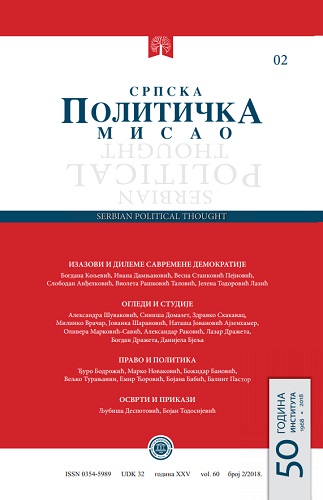Релевантност међународног суда правде и међународна безбедност
The Relevance of the International Court of Justice and International Security
Author(s): Marko NovakovićSubject(s): International Law
Published by: Институт за политичке студије
Keywords: International Court of Justice; appointment of judges; trust; international security; major powers
Summary/Abstract: Professor Eric A. Posner published in December 2004 an article “The Decline of International Court of Justice”, in which he analyzed decline of a caseload and therefore a trust in the International court of justice (ICJ). He analyzed two possible theories for this decline. On the one side he sees the issue in bias law application by ICJ judges and on the other side he sees ICJ as a victim of conflicting states interests. Following his arguments and analysis, we are going to test these issues in the period 2004- 2017 and explore if there are additional causes of this distrust as well. One may ask how these statistical data are connected to the international security? Although these two things might seem as not very connected, trust in the ICJ, especially if it is put in the line with another analysis that was conducted in this research – judge appointment at the ICJ. Connection, when established as following, is very obvious – ICJ as a principal judicial organ of the UN and the court with importance in the world stage, that surpass this formal title. ICJ has an immensely important role in conducting one of the main UN tasks – keeping the world safe and peaceful place. This role can only be achieved if numbers of cases, potential military conflicts, are brought in front of the ICJ especially those by “great powers”. And one of the main reasons why states are reluctant to do this is lack of transparency and bias approach of the ICJ judges. This appointment procedure is heavily affected by the P5 influence, not only because of the fact that every P5 member has always its citizen in the chamber, but also due to the fact that this practice limits positions for the other countries within regional groups. However, even that this “privilege” might be perceived as an example of inequality and to some point it definitely is, one have to take into consideration the fact that P5 members are contributing to the UN budged with over 40%. Although ICJ has its procedural and material imperfections, it was a long way to its establishment and all actors at the international stage have to carefully consider its role and influence. This especially goes to the main and most important subjects of international law, and the ones that are responsible for the formation of the ICJ but also for its preservation and relevance – states.
Journal: Српска политичка мисао
- Issue Year: 2018
- Issue No: 2
- Page Range: 257-271
- Page Count: 15
- Language: Serbian

